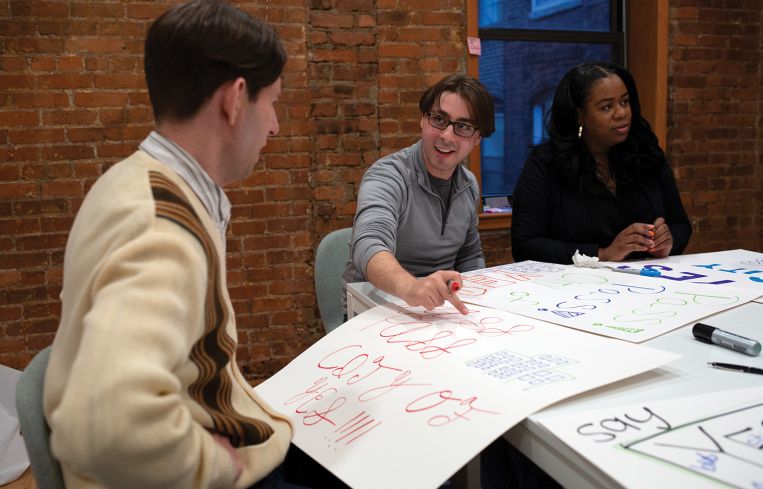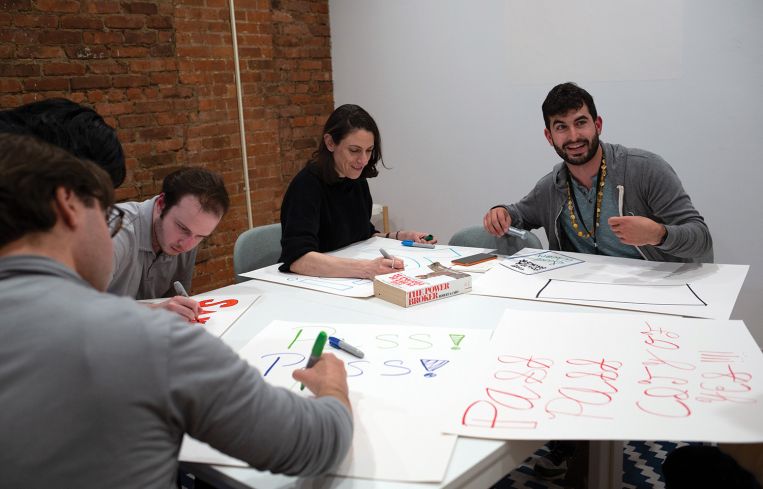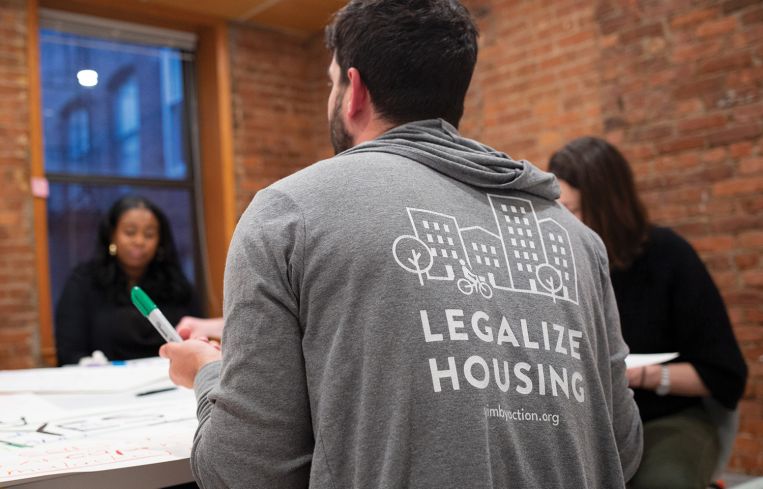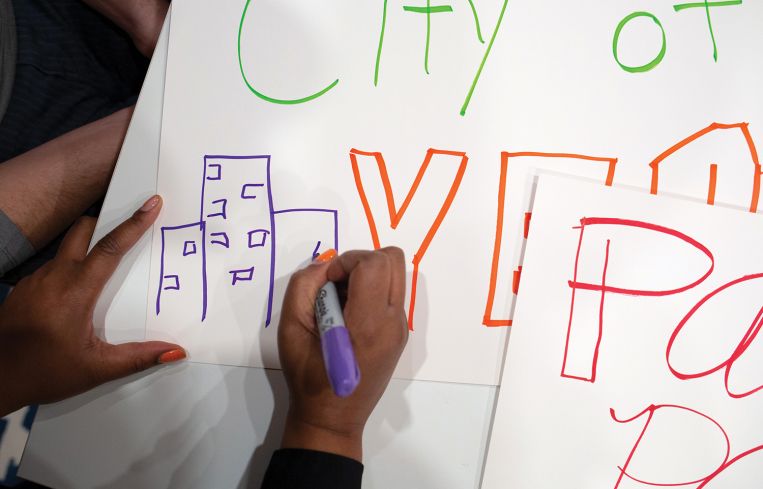Open New York Has a Super PAC, and a New Roadmap to Solve the Housing Crisis
YIMBYists Open New York are ready to back pro-housing candidates in a swing district near you
By Abigail Nehring April 8, 2024 12:28 pm
reprints



Believe it or not, Open New York isn’t that interested in your backyard.
The nonprofit upstart that fights for “abundant homes and lower rent” in New York state has survived for nearly a decade — depending on how you count — and it’s been filing taxes as a membership-based civic organization for the last four years.
But the YIMBY contingent has grown allergic to that acronym and the weary old battle lines it evokes. Community boards still boo at the same decibel level they did 10 years ago.
The pro-housing group isn’t twisting itself up in knots with that approach anymore. A new funding stream from a Silicon Valley philanthropist helped change the game, along with smaller grants from Trinity Church Wall Street in 2023 and the Robin Hood Foundation this year. Open New York now has a six-person staff with 12 chapters across the state and a clearer strategy.
Last month, it launched a political action committee, Abundant New York, the first statewide super PAC committed solely to addressing New York’s housing shortage. It will now present its platform to candidates running in this year’s state legislative elections as it dangles a six-figure independent expenditure budget in front of them.
And, over the next few years, Open New York expects Abundant New York’s campaign contributions will reach at least $2 million.
“Our work to date has focused on individual project advocacy, grassroots member organizing, and public education work,” said Open New York Executive Director Annemarie Gray, who joined the organization after serving as a senior policy adviser on land use and fair housing for City Hall. Before that, she did a stint at the New York City Economic Development Corporation and also worked for former Deputy Mayor Vicki Been.
“Now we want to make housing an issue in every election,” Gray said. “We need to elect champions who will fix our state’s broken and outdated housing policies.”
A mere 1.4 percent of New York City’s rental units are vacant, and New Yorkers are navigating the tightest rental market since 1968.
The state’s overall housing shortage is staggering. The Regional Plan Association estimates New York needs to add 800,000 housing units over the next decade to address the current gap and meet the demands of future growth.
Open New York believes the state must build its way out of the housing crisis, and it applies this pro-development stance widely, while also supporting tenant protection measures such as State Sen. Julia Salazar’s “good cause” eviction bill, which would guarantee lease renewals and make it harder to raise rents.
Its agenda for Albany this year includes passing the Faith-Based Affordable Housing Act, which would allow religious organizations to build housing on their properties more easily. It’s also pushing for lawmakers to legalize accessory dwelling units and basement apartments, and it wants to lift the state’s floor area ratio cap to allow higher-density residential development.
Open New York states that it does not accept contributions from developers or the real estate industry, and neither will its new super PAC.
Anyway, it would be an unlikely alliance.
“I don’t think there’s real estate money behind Open New York. What to look at as a key difference is Open New York’s ridiculous position on good cause,” said Jordan Barowitz, a public relations guru and former spokesperson for the Durst Organization, a developer and owner. “If you are in favor of the Salazar bill, there is no rent growth, and so there’s no way to build buildings, so this is a big paradox.”
Those misgivings aside, Barowitz agrees with many other tenets of the group’s pro-housing platform.
“It was a mantra of tenant advocates, of progressive organizations, that ‘You can’t build your way out of the housing crisis,’ ” he said. “There are still some people who hold on to that, but it has largely been discredited. Almost everybody agrees now that New York suffers fundamentally from a lack of supply.”
Barowitz left Durst two years ago to launch his own political consultancy. Before that, he was former Mayor Michael Bloomberg’s press secretary. He said it’s naïve to assume New York City is the maker of its own destiny when it comes to housing policy.
“The city has land use and zoning control, which is huge. But with affordable housing policy, the city is really a creature of the state.”
He sees an independent expenditure committee as a natural next step for Open New York and “a sign of sophistication.”
Other industry figures are all too eager to spell out the argument for the supply-side solution to New York’s housing crisis.
“I mean, look at the pandemic,” said Bob Knakal, founder of BK Real Estate Advisors and a top investment sales broker. “When so many people left New York, vacancy rose significantly. Rents dropped 30 percent. There’s not a housing policy that anyone across the United States has implemented that made rents go down 30 percent.
“Make more supply,” Knakal said. “We need new supply.”
Anyone who finds this argument compelling can become a card-carrying member of Open New York for an annual payment of $36. Members must agree with the premise that New York needs to build much, much more housing for all income levels in every neighborhood.
Dues-paying members can vote in elections and run for committee positions, lead working groups, attend workshops and make friends with other Open New Yorkers while eating pizza in a bar on the Lower East Side.
About 600 have signed on to date. A preponderance of them are renters, including Samir Lavingia, who became chair of Manhattan Community Board 5 in March, causing an upheaval on a board that oversees major land use matters in Midtown. Members also skew young, and they tend to be digitally native, or at least more active on social media sites like X, formerly known as Twitter.
None of this is an accident. The organization’s original members found each other on Twitter, where they bonded over the hot topics of then-Mayor Bill de Blasio’s administration circa 2018. City Planning’s neighborhood plans for Gowanus, SoHo and NoHo captured the zeitgeist.
In fact, YIMBY groups springing up across the country have followed much the same pattern.
“Twitter was a major platform for us finding each other,” said Matthew Lewis, the communications director of California YIMBY.
“There was a group of us across the country who were live-tweeting these housing hearings. And we’d be like, ‘Oh, my God, I can’t believe that person said that in D.C.’ And then someone from Portland says, ‘Oh, my God, I was at a Portland meeting and they said the same thing.’ ”
California YIMBY is significantly ahead of its New York counterpart. It currently has about 80,000 members, for one thing. But Lewis said many major U.S. metro areas share a common story that traces back to the wave of downzoning that occurred across the country alongside the post-World War II flight to suburbia.
When Lewis’s friends started moving to San Francisco in the early 1990s, he said the city “had a cushion of empty residences to absorb all of that. They were dirt cheap. But the cushion ran out. And we didn’t adapt.”
Since registering as a tax-exempt 501(c)(4) nonprofit organization in 2020, Open New York has become markedly less ragtag, thanks in large part to grants totaling $3.5 million it has received from the Open Philanthropy Action Fund (OPAF), the public policy and lobbying arm of Facebook co-founder Dustin Moskovitz’s effective altruism project, Open Philanthropy.
This funding took New York’s nascent pro-housing movement up a notch.
Moskovitz was Facebook’s chief technology officer until he departed the company in 2008 to launch task management platform Asana. He’s worth $25.2 billion, according to Bloomberg’s Billionaires Index.
The umbrella organization, Open Philanthropy, is a donor-advised fund Moskovitz and his wife, former Wall Street Journal reporter Cari Tuna, established to carry out their altruistic vision of giving away their multibillion-dollar fortune during their lifetimes. Thus far, the couple has unburdened themselves of about $1 billion.
Moskovitz and Tuna restructured Open Philanthropy in 2017 and formed OPAF as a spinoff focused initially on criminal justice reform.
By 2018, the action fund branched out to support other causes, providing an inaugural grant of $850,000 to a 1-year-old membership-based organization called California YIMBY. The funds were to be used exclusively to end California’s housing shortage, Open Philanthropy stated in its tax filing.
Both California YIMBY and Open New York are now part of Open Philanthropy’s “land use reform” grant program, which has doled out about $23 million to similar pro-housing groups around the country, according to its website. Open Philanthropy also sponsors the annual national YIMBYtown conference, which takes place in a different state every year.
Open New York received a $996,392 grant from OPAF in 2021 — a windfall that allowed it to hire William Thomas as its executive director and first full-time employee. The enormous check from OPAF dwarfed the $190,544 Open New York gained from contributions the previous year, and only $26,246 entered the organization’s coffers from other sources during the rest of 2021.
“Local laws that prohibit the construction of new housing in dynamic places like the New York metropolitan area increase the cost of housing, weaken the economy for everyone, and make inequality and climate change worse,” an Open Philanthropy spokesperson said in a statement.
Open New York put the cash to work, spending a lavish $158,889 to roll out its membership program and launch other pieces of its long-term vision.
It took a first stab at endorsements that year, throwing its support behind eight New York City Council candidates ahead of 2021’s elections. Four of them won: Shaun Abreu, Pierina Sanchez, Althea Stevens and Marjorie Velázquez.
In 2022, OPAF awarded Open New York another $500,000, this time restricting the funds’ purpose to “state-level advocacy.”
As the 2022 New York budget season kicked off, Thomas testified on behalf of Open New York before the state legislature’s joint budget hearing on housing.
“New York is unique among many of its Northeastern peers in having no statewide legal framework that pushes cities and towns to provide a baseline amount of affordable housing,” Thomas said.
It was an apt description of Gov. Kathy Hochul’s housing compact, which she would present to lawmakers a year later.
As for its downstate agenda, Open New York is throwing its weight behind Mayor Eric Adams’s “City of Yes” zoning text amendment, a set of citywide changes that would increase housing supply incrementally in every neighborhood. The text amendment is set to begin public review this spring.
From 2020 to 2022, Open New York brought in a total of $1.8 million in revenue in the form of contributions and grants, according to its tax filings. Nearly all of those funds came from Open Philanthropy.
Last year, Open New York received a $200,000 grant from Trinity Church Wall Street. Trinity reported in its 2022 financial statement that the “strong financial foundation” of its $6.1 billion real estate portfolio “determine[s] the amount spent in support of Trinity’s mission each year.”
However, a Trinity Church spokesperson said that Hudson Square Properties, the joint venture between Trinity, Norges Bank and Hines that has developed a 12-building portfolio on 14 acres Trinity has owned since the 18th century, is a separate entity and doesn’t have a hand in the church’s philanthropic efforts.
A spokesperson for Hudson Square Properties did not respond to requests for comment.
Open New York also launched a new 501(c)(3) charitable arm focused on education and outreach, Open New York Education, which received a $175,000 grant from the Robinhood Foundation earlier this year. The Trinity Church spokesperson said it donated to Open New York Education.
“I would say we’re five to 10 years behind California in terms of the manifestations and recognition of the housing crisis,” said Michelle Kuppersmith, the chair of Open New York’s board of directors. “There are a lot of roadblocks when you’re doing this project by project, which is what Open New York had done when I first started. But we realized that to affect real change, we should really be focusing on the state level.”
For her day job, Kuppersmith heads the nonprofit corporate watchdog group Campaign for Accountability. She cut her teeth in city zoning battles as an outspoken member of Manhattan Community Board 3 during the protracted public review of the city’s neighborhood plan for SoHo and NoHo.
It was a formative experience, according to Kuppersmith, and left her desperate for new tactics. Open New York did some soul searching, too.
“I think that we have a unique moment here in New York state,” she said. “We’re on the cusp of what could be big change here.”
Update: This story has been updated to include a statement from Trinity Church Wall Street.



